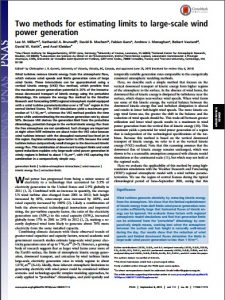Full Title: Two methods for estimating limits to large-scale wind power generation
Author(s): Lee M. Miller, Nathaniel A. Brunsell, David B. Mechem, Fabian Gans, Andrew J. Monaghan, Robert Vautard, David W. Keith, and Axel Kleidon
Publisher(s): Proceedings of the National Academy of Sciences
Publication Date: August 1, 2015
Full Text: Download Resource
Description (excerpt):
Wind turbines remove kinetic energy from the atmospheric flow, which reduces wind speeds and limits generation rates of large wind farms. These interactions can be approximated using a vertical kinetic energy (VKE) flux method, which predicts that the maximum power generation potential is 26% of the instantaneous downward transport of kinetic energy using the preturbine climatology. We compare the energy flux method to the Weather Research and Forecasting (WRF) regional atmospheric model equipped with a wind turbine parameterization over a 105 km2 region in the central United States. The WRF simulations yield a maximum generation of 1.1 We·m−2, whereas the VKE method predicts the time series while underestimating the maximum generation rate by about 50%. Because VKE derives the generation limit from the preturbine climatology, potential changes in the vertical kinetic energy flux from the free atmosphere are not considered. Such changes are important at night when WRF estimates are about twice the VKE value because wind turbines interact with the decoupled nocturnal low-level jet in this region. Daytime estimates agree better to 20% because the wind turbines induce comparatively small changes to the downward kinetic energy flux. This combination of downward transport limits and wind speed reductions explains why large-scale wind power generation in windy regions is limited to about 1 We·m−2, with VKE capturing this combination in a comparatively simple way.
